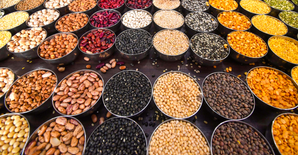Fermenting legumes, pulses can boost antioxidant, antidiabetic properties: Study
By IANS | Updated: June 7, 2025 17:58 IST2025-06-07T17:50:42+5:302025-06-07T17:58:24+5:30
New Delhi, June 6 Love to consume legumes and pulses? Fermenting them can help raise their antioxidant levels, ...

Fermenting legumes, pulses can boost antioxidant, antidiabetic properties: Study
New Delhi, June 6 Love to consume legumes and pulses? Fermenting them can help raise their antioxidant levels, as well as raise their ability to fight diabetes, according to a study.
Food scientists at the University of Illinois Urbana-Champaign, US, identified the optimal fermentation conditions for pulses --the dried edible seeds of legumes -- that increased their antioxidant and antidiabetic properties and their soluble protein content.
In the study, the team fermented pulses obtained from varying concentrations of black beans, black-eyed peas, green split peas, red lentils, and pinto bean flour. The fermentation was done using the bacteria Lactiplantibacillus plantarum 299v as microorganisms.
The results showed that antioxidant activity increased by up to 83 per cent and their capacity to regulate Type 2 diabetes markers increased by 70 per cent. Fermentation also increased the amount of soluble protein in these food items.
Red lentils and green split peas showed the greatest improvements in antioxidant scavenging activity and protein solubility. These also demonstrated the greatest modulation of two enzymes that improve insulin metabolism.
Lp299v is a probiotic strain "containing microorganisms that support gut health," explained first author Andrea Jimena Valdés-Alvarado, a graduate student at the varsity.
"After fermentation, it remains in the digestive process. It will not only preserve the fermented product that you're consuming, but it will also produce these peptides or amino acids that are more easily absorbed than the intact protein in the pulses," Valdés-Alvarado said.
Further, Lp299v is also known to reduce inflammation, boost immunity, and enhance iron absorption, the team said, in the paper published in the journal Antioxidants.
"These pulses contain between 18 per cent and 25 per cent good-quality proteins that can be used alone or as ingredients in other food products. We need to find adequate processing conditions and motivate the food industry to use them in dairy beverages or meat substitutes," said Elvira Gonzalez de Mejia, Professor of food science from the varsity.
The researchers stressed the need to explore the sustainability of plant-based diets amid global food insecurity, shortages of natural resources, and climate change.
Disclaimer: This post has been auto-published from an agency feed without any modifications to the text and has not been reviewed by an editor
Open in app